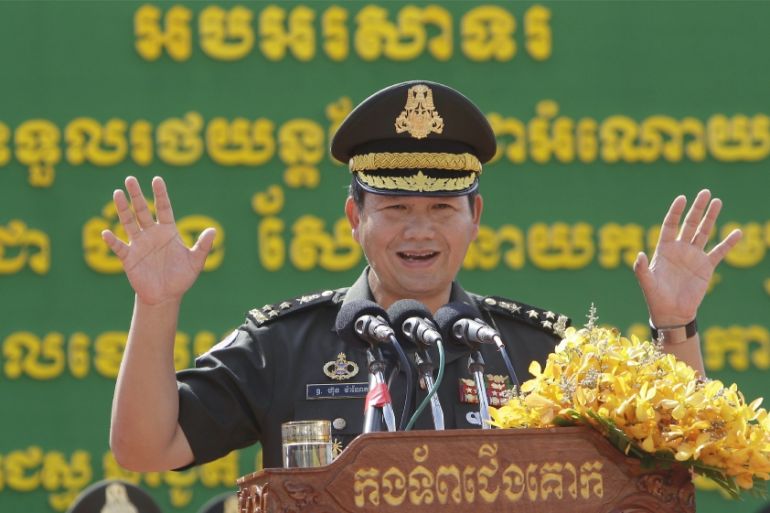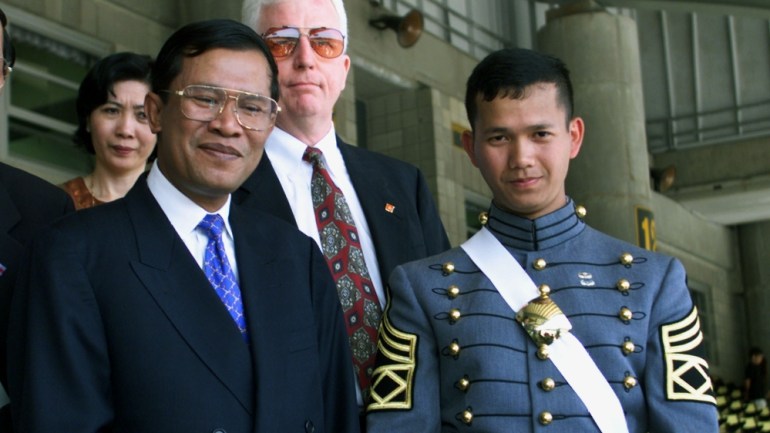A new Hun rises: Cambodia’s ruling party meets to plot its future
Cambodian People’s Party set to choose a future successor to Prime Minister Hun Sen, one of the world’s longest serving leaders.

Cambodia’s governing party is set to select a successor to Prime Minister Hun Sen at an extraordinary congress on Friday, with the outcome all but determined after the 69-year-old leader endorsed his eldest son for the post.
Hun Sen, who has ruled Cambodia for almost 37 years, announced on December 2 that “Hun Manet is one of the candidates for prime minister and receives support from his father.”
Keep reading
list of 4 itemsUS tightens curbs as Cambodia moves closer into China’s embrace
Myanmar official in Cambodia for talks as global censure grows
Hun Sen, Cambodian leader for 36 years, backs son to succeed him
His choice paves the way for a political dynasty, with critics saying it reflected Hun Sen’s fear of losing immunity when he can no longer govern. The Cambodian prime minister is one of the world’s longest-serving leaders, having ruled the Southeast Asian nation for nearly 37 years. He has effectively turned Cambodia into a one-party state, by having the main opposition party banned in 2017 and cracking down on political opponents, rights groups and journalists.
“I will support and educate [Hun Manet] to unleash his fullest potential,” Hun Sen said of his son last year. “If he is not capable as his father, he might get at least 80 to 90 percent out of me. Yet, it depends on people’s voices. The first concern is whether the party would accept him. The second is the general elections.”
While pegged for the top political role in the country, Hun Manet, 44, currently does not hold any public office and has much more experience in uniform than in politics. A graduate of the United States Military Academy at West Point, he rose quickly through military ranks, overseeing negotiations during a border dispute with Thailand in 2011, at just 33 years old. In 2018, he was promoted to commander of the Cambodian army, holding the second-highest military position in the country. His limited political experience is within the party apparatus, serving in the governing Cambodian People’s Party and all-powerful Standing Committee and as head of the youth wing.

Even if the CPP were to back Hun Manet, he may not take over the role until at least 2028, as his father has displayed a reluctance to transfer power any time soon. Hun Sen said on December 2 that he could remain in power another 10 years, and confirmed on December 6 that he intended to remain the country’s prime minister in the next election in 2023.
Analysts have said Hun Sen’s decision to endorse his son as a successor years before an actual transition brought risks to Hun Manet, especially as there were signs that some in the CPP do not agree with the move.
“I would have thought the 2023 election is the best time to transfer power,” said Lee Morgenbesser, a senior lecturer at Australia’s Griffith University, noting that Hun Sen currently has the total support of the CPP, the security apparatus, business community and “faces no serious political opposition”.
“Signalling he will transfer power to Hun Manet in 2028 risks putting a target on his son’s back. Should other members of the political elite be aggrieved by the selection of Hun Manet, they now have ample time to muster a challenge to him,” Morgenbesser said.
‘Party’s leadership does not agree’
Lao Mong Hay, a veteran Cambodian political analyst, said Manet’s succession is likely but not guaranteed, and recent tensions between Hun Sen and interior minister Sar Kheng were a hint that “the party’s leadership did not agree with the nomination of his son.”
Long seen as Hun Sen’s most powerful rival within the CPP, Kheng did not join the scramble of high-ranking politicians who endorsed Manet. When he did eventually break his silence, Kheng pledged to support the party’s nominee, but did not name Manet specifically.
To address any grievances, Lao Mong Hay expected Hun Sen to engage in a bit of “horse-trading”. In addition to putting forward his son as a prime minister candidate, Hun Sen has also been looking to refresh the CPP’s senior ranks at the upcoming party congress. He has planned to nominate a “reserve cabinet”, made up only of politicians under the age of 60 who will then be phased into top-level positions. These positions could be used to placate any dissenters.
While most believed Manet will ascend to the prime minister’s office, few expect him to redefine Cambodian politics. When asked about what he expected from Manet as a leader, Lao Mong Hay instead commented on the political system his father built.
“The party-state system is so entrenched for the protection of the current ruling elite’s interests and those of its cronies that it is very difficult to introduce new ideas as those new ideas would almost inevitably affect those interests and could unravel the whole system,” he said.
In a recent essay, academic Kevin J Doyle studied Hun Sen and Manet’s social media behaviour, arguing that Manet is attempting to “mirror” his father by constructing a friendly, non-political online persona.
Doyle, former editor-in-chief of the now-shuttered Cambodia Daily, analysed nearly 2,400 photographs posted to Manet’s Facebook page, finding that almost 20 percent of the pictures showed him hugging or in close contact with young or elderly members of the general public. Approximately 12 percent showed him posing for selfies. In comparison, only 5 percent were related to elections or campaigning.
Doyle said he also copies his father’s practice of advertising “gift-giving activities” online. “In closely replicating his father’s gift-giving practices, Hun Manet also signals adherence to the political-economic order on which the CPP’s patron-client powerbase has been built,” he wrote.
Chinese influence
Astrid Noren-Nilsson, author of Cambodia’s Second Kingdom, said she does not expect anything “vastly different” from Manet in terms of “leadership style” or political “liberalisation”.
She said, like Hun Sen, Manet is “adaptive and responsive” and could “kick off his premiership” with some minor reforms to satisfy political opponents. But with so much time still remaining before the transition, it’s “almost impossible to know” who these concessions would be aimed at.
Noren-Nilsson predicted that Manet was also unlikely to oversee any major shift towards the West, with relations between Cambodia and the US have strained in recent years, including between their militaries.
Citing “growing Chinese influence”, the US announced an arms embargo and earlier in December imposed sanctions on top Cambodian defence officials. In 2016, Cambodia launched annual joint military exercises with China, cancelling similar exercises with the US one year later. Meanwhile, Manet, who is also commander of the Cambodian army, met a Russian security delegation in December and pledged to increase military cooperation.
Although Cambodia continues to shift deeper into China’s orbit, Noren-Nilsson said she expected him to remain flexible in the international arena, and said his background could facilitate negotiations that struggled under his father’s leadership.
While Manet spent much of his youth in New York, Hun Sen has struggled with basic English and came of age in a rural Cambodian village during a communist rebellion and American bombing campaign.
“His international position-taking will entirely depend on considerations of realpolitik and the geopolitical context at any given moment in time. If that at some point would bring a rapprochement with the Western powers, then his educational background might help make those exchanges more comfortable than they were in the past,” Noren-Nilsson said.